How Can Other Countires Ever Begin to Trust the United States Foreign Policy Again
Simply many enhance concerns about wellness of U.S. political system
The election of Joe Biden equally president has led to a dramatic shift in America'southward international paradigm. Throughout Donald Trump's presidency, publics around the world held the United States in low regard, with most opposed to his foreign policies. This was particularly true among primal American allies and partners. At present, a new Pew Research Center survey of 16 publics finds a significant uptick in ratings for the U.South., with strong support for Biden and several of his major policy initiatives.
This analysis focuses on public opinion of the United States in xvi avant-garde economies in North America, Europe and the Asia-Pacific region. Views of the U.Due south. and its president are examined in the context of long-term trend information. The report also explores how people view President Joe Biden's proposed policies and characteristics.
For this written report, we apply data from nationally representative surveys of 16,254 adults from March 12 to May 26, 2021. All surveys were conducted over the phone with adults in Canada, Belgium, France, Federal republic of germany, Greece, Italian republic, holland, Spain, Sweden, the Britain, Australia, Nippon, New Zealand, Singapore, Republic of korea and Taiwan.
This study was conducted in places where nationally representative telephone surveys are viable. Due to the coronavirus outbreak, contiguous interviewing is not currently possible in many parts of the world.
Here are the questions used for the written report, along with responses, and the survey methodology.
In each of the 16 publics surveyed, more than six-in-10 say they have confidence in Biden to do the right thing in world affairs. Looking at 12 nations surveyed both this year and in 2020, a median of 75% express confidence in Biden, compared with 17% for Trump last year.
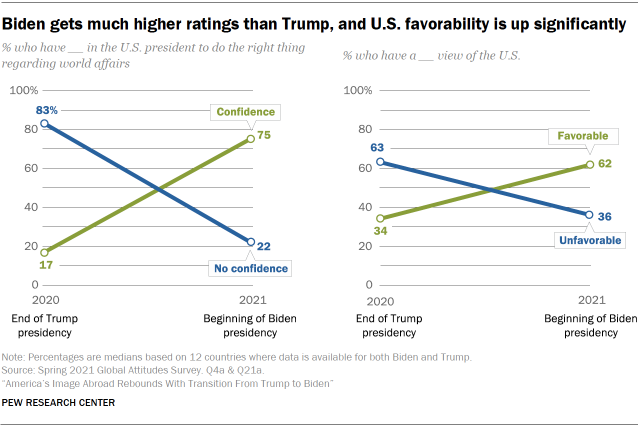
During the by two decades, presidential transitions take had a major touch on on overall attitudes toward the U.Due south. When Barack Obama took office in 2009, ratings improved in many nations compared with where they had been during George W. Bush's administration, and when Trump entered the White House in 2017, ratings declined sharply. This year, U.Southward. favorability is upward over again: Whereas a median of just 34% across 12 nations had a favorable overall opinion of the U.S. last year, a median of 62% now concur this view.
In French republic, for instance, just 31% expressed a positive opinion of the U.S. final year, matching the poor ratings from March 2003, at the pinnacle of U.S.-France tensions over the Iraq State of war. This twelvemonth, 65% see the U.S. positively, approaching the high ratings that characterized the Obama era. Improvements of 25 percentage points or more are also found in Germany, Japan, Italia, the Netherlands and Canada.
All the same, attitudes toward the U.S. vary considerably beyond the publics surveyed. For case, only about half in Singapore and Australia accept a favorable stance of the U.South., and just 42% of New Zealanders hold this view. And while 61% come across the U.Due south. favorably in Taiwan, this is actually down slightly from 68% in a 2019 poll.
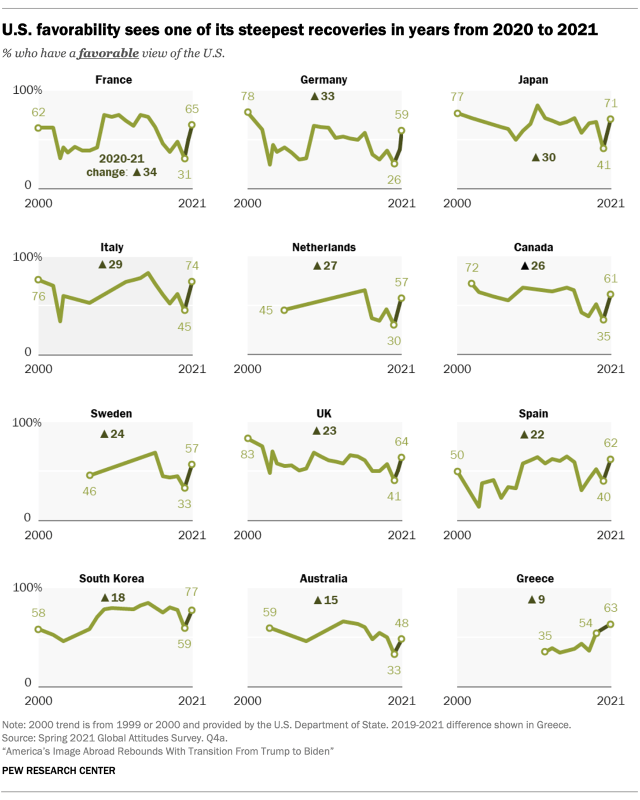
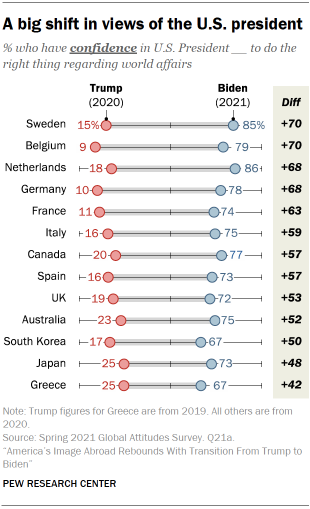
In about countries polled, people make a stark stardom between Biden and Trump as world leaders. About eight-in-x Germans (78%) accept confidence in Biden to practise the right thing in globe affairs; a year ago, just 10% said this virtually Trump. Similar differences are found in Sweden, Kingdom of belgium and holland, and in all nations where a tendency is available from 2020 there is a deviation of at least xl percentage points.
Every bit is the example with views of the United States every bit a whole, confidence in U.Due south. presidents has shifted dramatically over the past two decades, especially in Western Europe. In Federal republic of germany, the United Kingdom, Spain and French republic – iv nations Pew Enquiry Center has surveyed consistently – ratings for Bush-league and Trump were similarly low during their presidencies, while this year confidence in Biden is fairly like to the ratings Obama received while in role.

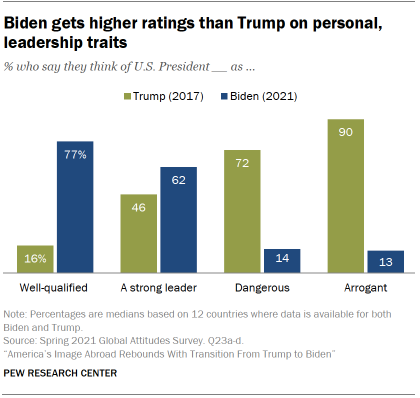
Biden's high ratings are tied in function to positive assessments of his personal characteristics, and hither again the contrast with Trump is stark. Looking at 12 countries polled during the first twelvemonth of both their presidencies, a median of 77% describe Biden as well-qualified to be president, compared with sixteen% who felt this style about Trump. Few recollect of Biden every bit arrogant or dangerous, while big majorities practical those terms to Trump. Assessments of the two leaders are more than similar when it comes to being a stiff leader, although even on this measure, Biden gets much more positive reviews than his predecessor.
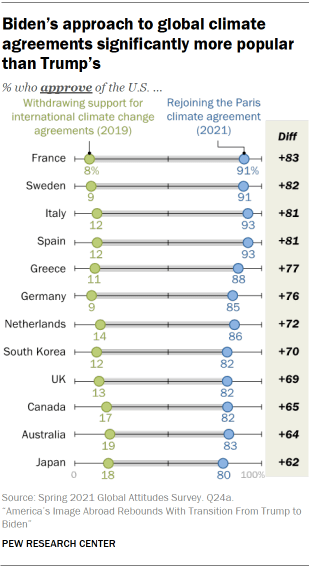
High levels of confidence in Biden are also tied to favorable views of his policies, several of which accept emphasized multilateralism and reversed Trump administration decisions. The current survey examines attitudes toward four of the Biden administration's key policies and finds widespread back up for all four.
A median of 89% across the xvi publics surveyed corroborate of the U.Due south. rejoining the World Health Organization (WHO), which the U.S. withdrew from during Trump'south presidency. A median of 85% also back up the U.Southward. rejoining the Paris climate understanding. Trump'south withdrawal from the Paris understanding was met with widespread criticism, and it was overwhelmingly unpopular in the surveys the Center conducted during his presidency. For instance, in 2019 just 8% in French republic approved of Trump'south plans to withdraw support for international climate change agreements, compared with 91% who now back Biden's reentry into the agreement.
Support for the Biden administration'southward proposal to organize a summit of democracies from around the world is likewise widespread, with a median of 85% proverb they corroborate. In that location is only slightly less support (a median of 76%) for Biden's program to allow more than refugees into the U.Due south. (Biden campaigned on allowing more refugees into the country, briefly reversed his initial goal to enhance the refugee cap from levels set by the Trump administration, and so walked dorsum the reversal amid criticism.)
Biden has also made clear that he plans to strengthen America'due south delivery to the NATO alliance. As the current poll shows, NATO is viewed positively by the member states included in the survey. (See "NATO continues to be seen in a favorable low-cal by people in member states" for more.)
Although Biden'southward more multilateral approach to strange policy is welcomed, there is still a widespread perception that the U.S. mainly looks after its own interests in earth affairs. More than one-half in almost of the publics surveyed say the U.S. does not take their interests into account when information technology is making foreign policy decisions, although fewer experience this mode in Nippon, Greece and Federal republic of germany.
Doubts about the U.South. because the interests of other countries predate the Trump administration, and this has been the prevailing view – even among close U.South. allies – since the Heart began asking the question in 2002.
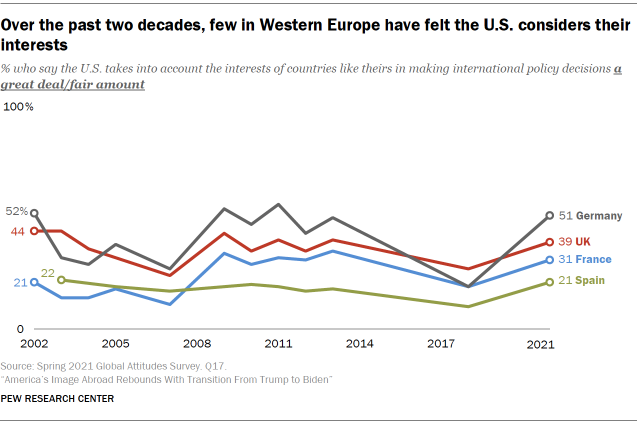
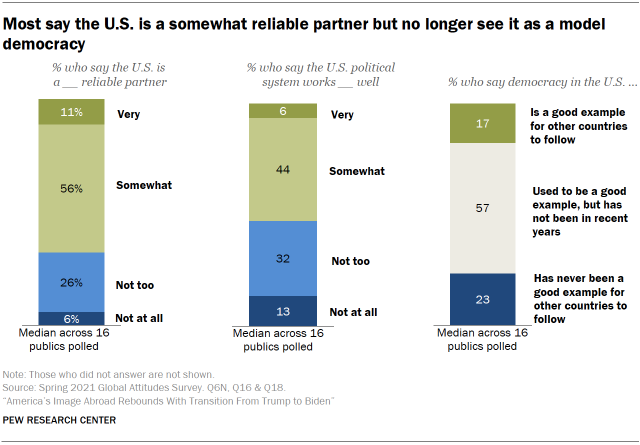
Despite widely reported bilateral and multilateral tensions between the U.S. and many of its major allies and partners over the last four years, relatively few people depict the U.S. as an "unreliable partner." But neither do they express dandy confidence in the U.Due south. as an ally. Across the 16 publics polled, a median of 56% say the U.S. is somewhat reliable, while just xi% depict America as very reliable.
In improver to the concerns some take about how America engages with other nations, there are as well concerns about domestic politics in the U.S. The sixteen publics surveyed are divided in their views well-nigh how well the U.South. political system is functioning, with a median of simply 5o% saying it is working well.
And few believe American democracy, at least in its current state, serves as a good model for other nations. A median of just 17% say democracy in the U.S. is a practiced case for others to follow, while 57% say information technology used to be a good example merely has non been in recent years. Another 23% do not believe it has ever been a proficient example.
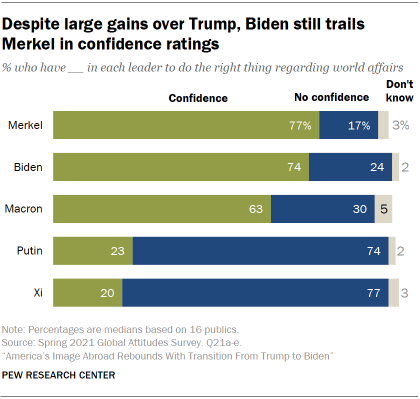
1 of the reasons for the depression ratings the U.S. received in 2020 was the widespread perception that it was handling the global pandemic poorly. In the electric current poll, the U.South. gets significantly more positive marks for how it is handling COVID-nineteen, merely well-nigh still say the U.Southward. has done a bad job of dealing with the outbreak (for more, run into "Global views of how U.Due south. has handled pandemic accept improved, just few say it's washed a expert job").
In his get-go overseas trip as president, Biden is preparing to attend the G7 summit in the United kingdom of great britain and northern ireland and the NATO meridian in Brussels. Once there, he will encounter with ii other leaders widely trusted for their treatment of world affairs.
German Chancellor Angela Merkel actually receives slightly higher ratings than Biden: A median of 77% across the 16 publics surveyed express confidence in Merkel'southward international leadership. A smaller median of 63% voice confidence in French President Emmanuel Macron.
Relatively few trust Russian President Vladimir Putin to do the right thing in globe affairs, while Chinese President 11 Jinping has the lowest ratings on the survey.
These are amidst the major findings from a Pew Research Center survey conducted among xvi,254 respondents in 16 publics – non including the U.S. – from March 12 to May 26, 2021. The survey also finds that views toward the U.S. and President Biden ofttimes differ past ideology and age.
Spotlight: How views of the U.S. vary with political ideology and age
Credo
In many of the publics surveyed, ideological orientation plays a function in how people view the U.S. and American democracy.
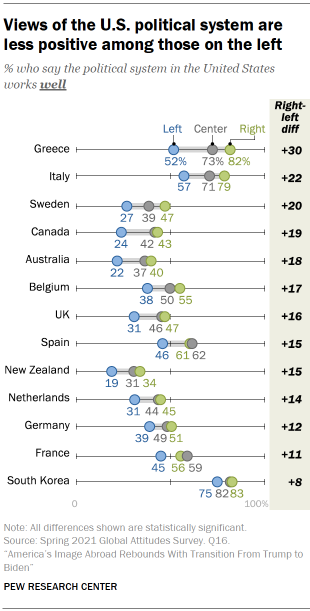
- People who identify themselves on the right of the political spectrum are more than likely to take a positive view of the U.S. in most every country where ideology is measured. And this full general pattern has not changed much over time, with those on the right holding a more favorable view of the U.South. during the Trump and Obama administrations besides.
- In 11 countries, people on the right are more than probable than those on the left to say democracy in the U.South. is a proficient instance for other countries to follow. And in a similar set of countries, they are also more likely to think the U.S. political organization works well.
- Overall, majorities on the left, middle and right of the political spectrum approve of the policies included in the survey. However, Biden's decision to allow more refugees into the U.South. is incomparably more pop amid people on the left. In about half the countries, those on the left are as well more probable to approve of the U.S. rejoining the World Health Organization.
Age
In general, favorable views of the U.S. practise not vary based on age in Europe or the Asia-Pacific region. Only historic period is a factor when it comes to confidence in the U.South. president and other earth leaders.
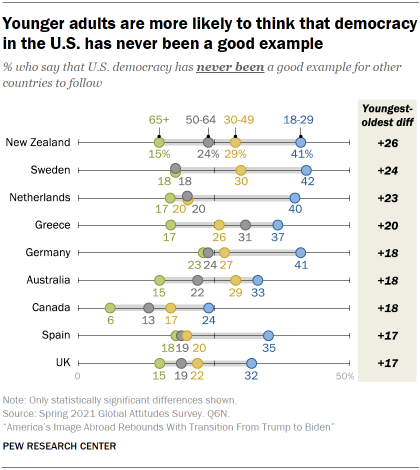
- Across nearly places surveyed, adults ages 65 and older are significantly more likely than those ages xviii to 29 to have confidence in Biden to do the right things in earth affairs. Trust in Biden is so high overall, all the same, that at to the lowest degree half in all age groups hold this view.
- Older adults likewise have more confidence in Merkel in half of the surveyed areas. Trust in Putin shows the opposite pattern, with younger adults more probable to have conviction in the Russian president in near of the publics surveyed.
- Adults under 30 also deviate from older adults in their views of American democracy. In most one-half of the publics surveyed, younger adults are more probable to think democracy in the U.S. has never been a good model for other countries to follow.
Favorable views of the U.South. have rebounded
In every place surveyed except New Zealand, effectually half or more have a favorable opinion of the U.S. Ratings are highest in South korea, where 77% have positive views of the U.S., and around two-thirds or more than in Japan, French republic and the Uk say the same.
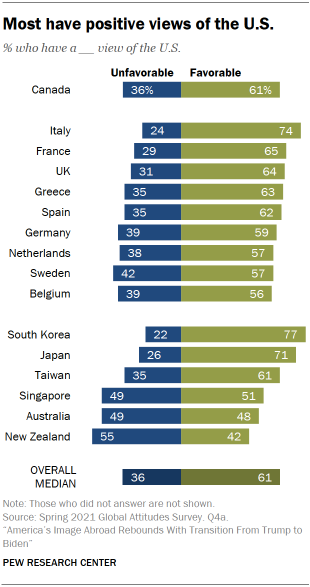
These broadly positive views reflect a sharp uptick since final summer, when ratings of the U.S. were at or near celebrated lows in virtually countries. For example, in Belgium, where only a quarter had favorable views of the U.Due south. last twelvemonth, a 56% majority say the aforementioned today.
In France, the Britain and Germany, positive views have increased even since this past November and December. Surveys in these three countries found tepid views of the U.Southward. last December – afterwards major media outlets had called the election for now-President Joe Biden but earlier his inauguration and the tearing storming of the U.S. Capitol on Jan. half-dozen by a mob of Trump'due south supporters. Evaluations ranged from xl% favorable in Germany to 51% in the Britain. Today, positive views have increased by double digits in all three countries, with around half dozen-in-ten or more in each of these countries now saying they view the U.S. favorably.
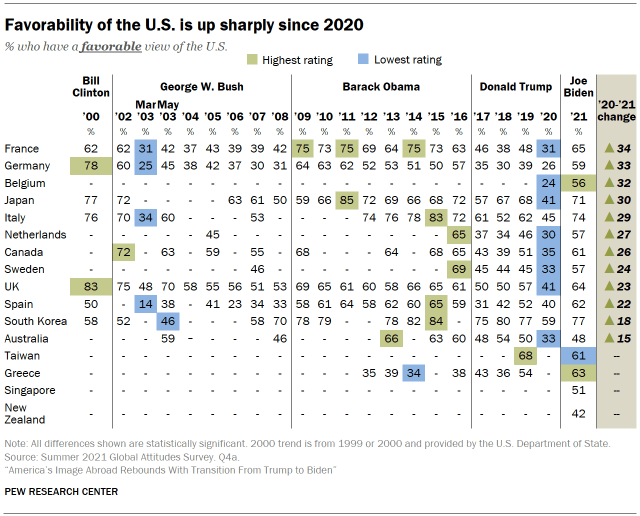
In many places, favorable views of the U.South. have now rebounded to roughly the aforementioned levels that were seen toward the finish of President Obama'south second term. Take France as an example: The share who take positive views of the U.S. has more than than doubled since terminal year, from 31% – a tape depression – to 65%, which is comparable to the 63% who had favorable views of the U.S. at the end of the Obama administration.
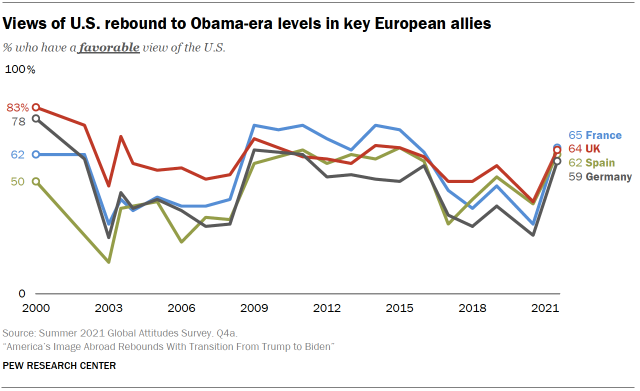
Views of American republic and foreign policy both cistron into how people feel about the U.S. For example, those who call back the U.Due south. political system is working well and those who think American democracy is a good example for other countries to follow are much more than likely to have favorable views of the U.South. Similarly, those who retrieve the U.Southward. is a reliable partner and who recall the U.S. takes other countries' interests into business relationship also have more positive views of the superpower. And people who believe the U.Due south. is doing a proficient job of dealing with the COVID-xix pandemic are more probable to limited a positive view of the country.
Some concerns nearly functioning of U.S. democracy
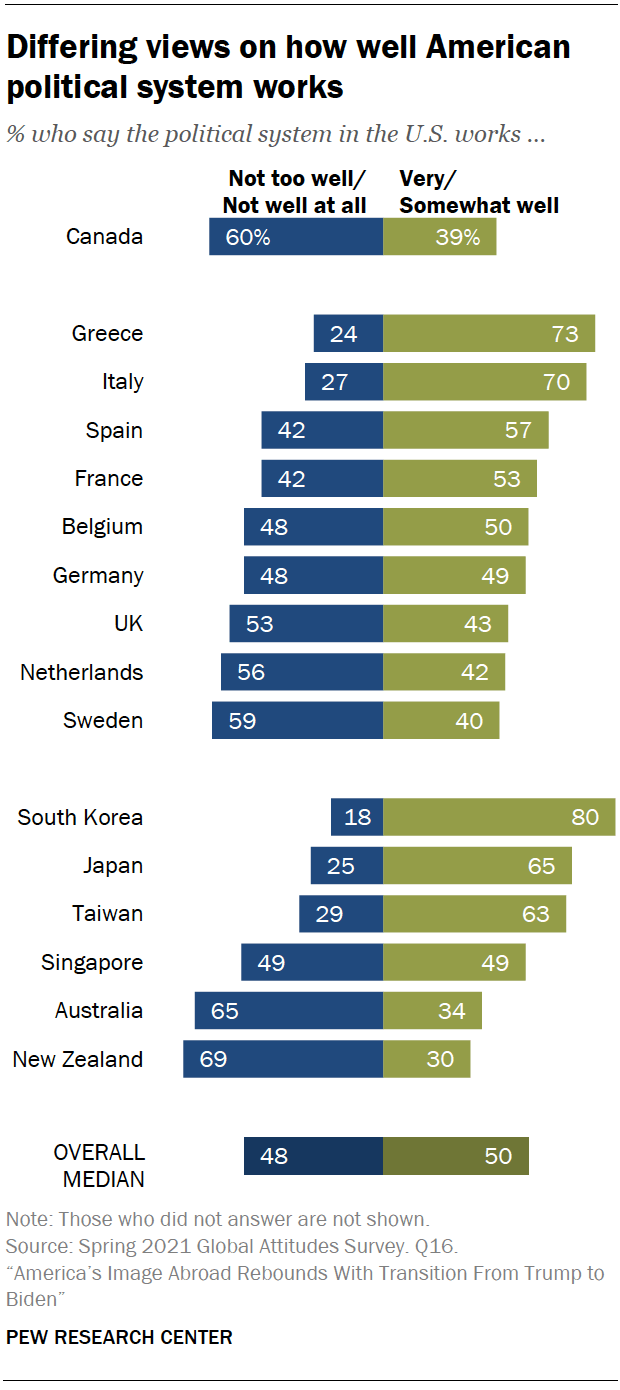
Majorities in New Zealand, Australia, Canada, Sweden and the Netherlands are skeptical of how the U.South. political organisation functions. On the flip side, majorities in South Korea, Greece, Italy, Japan, Taiwan and Espana express at to the lowest degree some confidence in the American system of regime.
However, even among publics where majorities call back the U.S. political system works at least somewhat well, this confidence is lukewarm: At most, near a fifth say the American political arrangement functions very well. In about places surveyed, the share who say this is smaller than one-in-10.
While attitudes are mixed about how well the U.Southward. political arrangement functions, publics in the avant-garde economies surveyed are largely skeptical that commonwealth in the U.Southward. is a good case for other countries to follow. Across all publics surveyed, no more than than about three-in-x say the U.South. is currently setting a skilful case of democratic values.
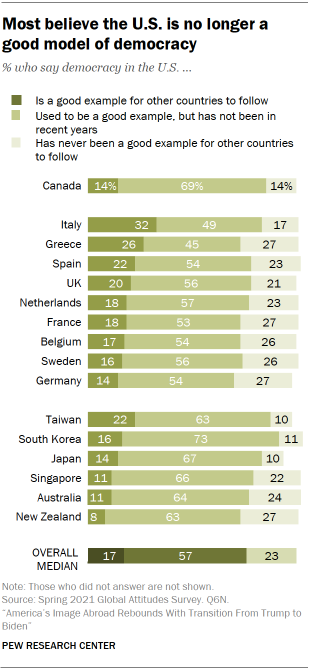
Rather, majorities or pluralities say American democracy used to be a good example but has not been in recent years, and up to about a quarter refuse the idea that the U.South. has always been a good model of democracy.
Only about a 3rd say the U.S. considers their interests in foreign policy
Despite the precipitous uptick in favorable views of the U.Due south. and its president in 2021, most people surveyed continue to say the U.South. doesn't have into business relationship the interests of publics like theirs when making international policy decisions. Beyond the xvi publics, a median of 67% say the U.Due south. does not take their interests into account too much or at all, while but 34% say Washington considers their interests a great deal or fair amount.
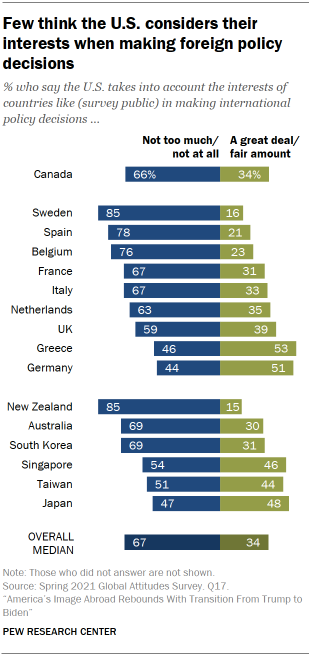
Across the European countries surveyed, there is a fair amount of variation in this cess. Equally few equally 16% in Sweden say the U.S. considers Sweden's interests when making foreign policy, but roughly half or more in Greece and Germany do. In Federal republic of germany, this represents a 32 percentage signal increase since 2018, when this question was last asked. Despite this uptick, replicated across many of the European nations surveyed in both years, majorities in the region say the U.S. does not consider their interests when making strange policy decisions.
Asian-Pacific publics besides tend to say Washington discounts their interests, including 85% amidst New Zealanders. Around seven-in-ten in Australia and Republic of korea, likewise as 54% in Singapore, concur that the U.S. does non consider their interests when making foreign policy.
In Taiwan, which has a complicated unofficial relationship with the U.S., 51% say the U.Southward. does not consider their interests, while 44% say it does. Among Japanese adults, opinions are most as divided between people who say the U.S. takes their views into account when making foreign policy and those that say the U.S. does non. (During the survey fielding, Japanese Prime Minister Yoshihide Suga visited the U.Due south., attention what was Biden's first face-to-face up meeting with a foreign leader since he became president.)
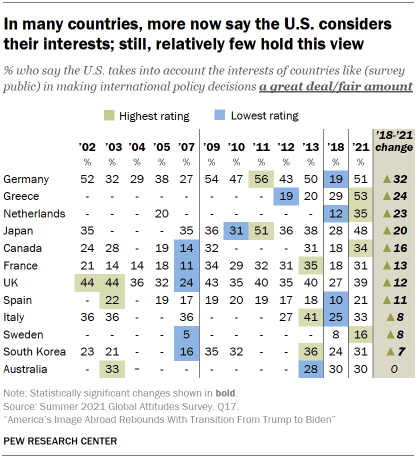
There have been meaning increases in the shares maxim the U.S. considers their interests when making foreign policy since the question was final asked during the Trump presidency. In add-on to the jump in Germany, there have been double-digit increases in such sentiment in Greece, the netherlands, Japan, Canada, France, the United kingdom and Spain. In Hellenic republic and Canada, this is the highest such reading in a Pew Research Eye survey, even compared with the Obama era.
Still, the predominant sentiment, going dorsum to 2002 when the question was commencement asked, is that the U.S. does not consider the interests of countries like theirs. The ballot of Joe Biden has not fundamentally changed that.
Nigh say that the U.S. is a somewhat reliable partner
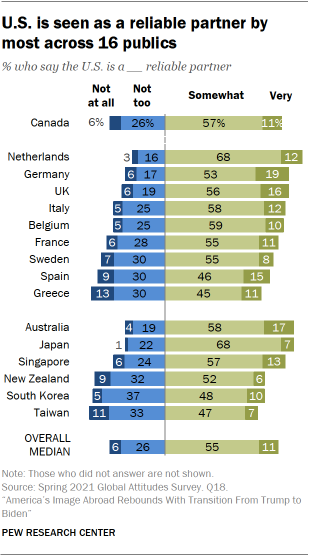
Beyond the 16 publics surveyed, majorities or pluralities say the U.S. is a somewhat reliable partner. Only in no public surveyed do more than 2-in-ten say that the U.S. is a very reliable partner.
At the same time, fewer than four-in ten say the U.S. is a non too reliable partner, and in no public do more than than i-in-vii say that the U.Southward. is a not at all reliable partner.
The sentiment that the U.S. is a very or somewhat reliable partner is highest in holland (80%), Australia (75%) and Japan (75%). But 44% in Taiwan and 43% in Hellenic republic say the U.S. is not besides or not at all reliable.
Nearly all say relations with U.S. will stay the same or go amend over the next few years
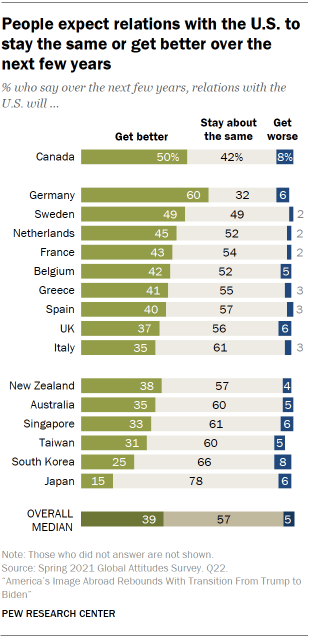
When asked whether relations with the U.Southward. will get better, worse or stay the same over the next few years, a median of 57% beyond the 16 publics say they will stay the same. While a continuation of current relations with the U.S. is the about common response, a median of 39% say relations will get meliorate and only 5% say they will get worse.
The merely place where a majority thinks relations with the U.S. will become improve is Frg (60% say this), where attitudes nearly the transatlantic alliance have get increasingly pessimistic in recent years. Half of Canadians as well say relations with their southern neighbor will get meliorate over the next few years.
In 2017, when this question was asked specifically most then-newly elected President Trump and his effect on bilateral relations, the most mutual answer was as well that they would remain the same. But back and so, few said that relations with the U.S. would amend nether Trump, and significant portions of the population thought they would deteriorate, including 56% in Germany who said this.
High confidence in Biden beyond Europe, Asia-Pacific
In the first year of his presidency, Biden enjoys positive ratings from majorities in each of the publics surveyed. Overall, a median of 74% take conviction in the U.South. president to do the right thing in world affairs.
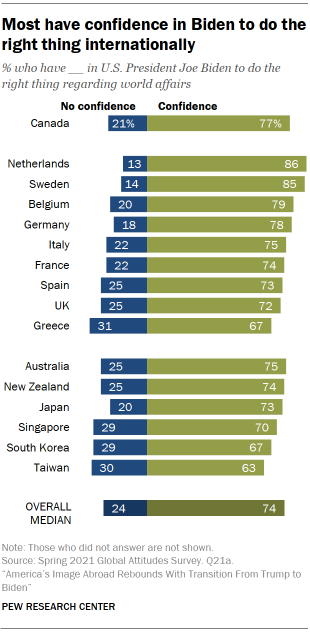
Confidence is particularly high in the Netherlands, Sweden, Kingdom of belgium, Germany and Canada, where about eight-in-10 or more trust Biden when it comes to international affairs. He receives his lowest ratings in Greece, South korea and Taiwan, though more than half dozen-in-ten in each trust his handling of world diplomacy.
Widespread confidence in Biden contrasts starkly with views of his predecessor. Trust in the U.S. president was historically depression in most countries surveyed during Trump'southward presidency. In many cases, however, the share who have confidence in Biden is not equally high equally the share who had confidence in Obama at the starting time or terminate of his presidency.
Germany is a good example of this pattern. In 2020, only x% of Germans had confidence in Trump to do the right thing in world affairs (matching a previous all-fourth dimension low before in Trump'southward presidency). In one case Biden took office, confidence in the U.S. president increased past 68 pct points in Frg, just it is notwithstanding lower at that place than the all-fourth dimension high of 93% in 2009, Obama'southward first year in office. A similar trend tin exist seen in Sweden, the netherlands, France, Italy, Canada, Australia, South Korea and Nippon.
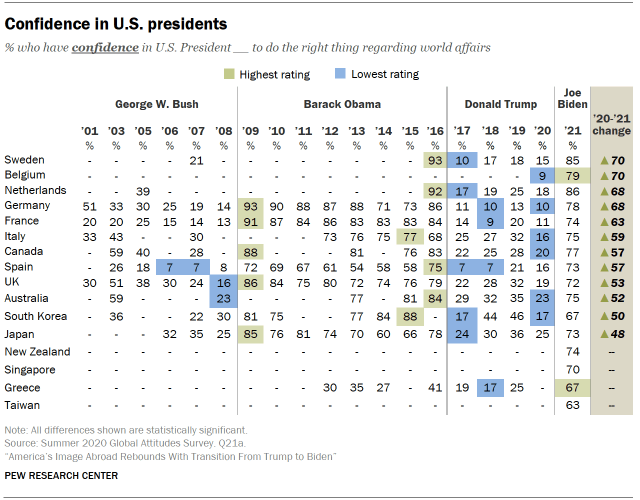
Nevertheless, in Greece, conviction in the U.S. president is the highest it has been since Pew Research Center first asked this question there. A much higher share of Greeks have confidence in Biden compared with Obama in 2016 and earlier. Notably, Biden has shared a positive relationship with Greek Prime number Government minister Kyriakos Mitsotakis, and Greeks are more than twice as likely now to say the U.South. takes their state's interests into business relationship when making policy decisions (53%) than they were when Obama was president (xx% in 2013).
Biden more trusted than Putin and 11, less trusted than Merkel
Publics express much more conviction in Biden than in Russian President Vladimir Putin or Chinese President Xi Jinping. Biden also fares well in comparison with French President Emmanuel Macron, but his ratings tend to trail those of German Chancellor Angela Merkel.
A median of 77% have conviction in Merkel to exercise the right thing in globe affairs. She receives somewhat higher ratings in holland, Sweden, Kingdom of spain, Belgium, France, New Zealand and Australia than in her home country, though a big majority of Germans yet limited confidence in the chancellor. Of the xvi publics surveyed, Hellenic republic is the just one where fewer than half agree this view. Faith in Merkel has also increased since the summer of 2020 in half dozen of the 12 countries where information is bachelor for both years.
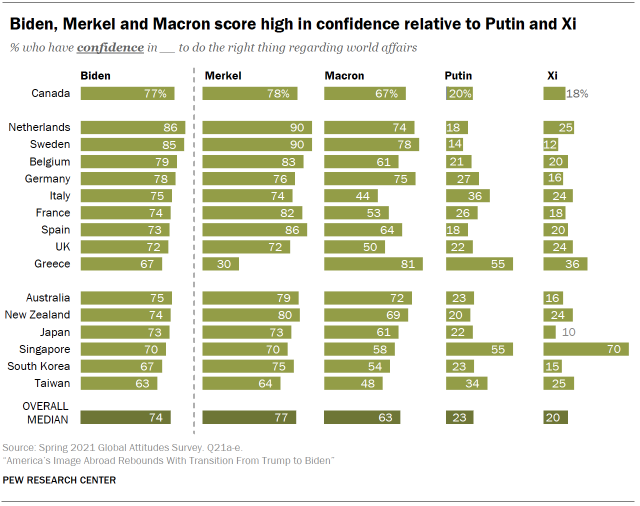
A median of 63% have confidence in Macron when it comes to his handling of world diplomacy. Roughly eight-in-ten or more agree this view in Greece and Sweden. As with Merkel, Macron's ratings in his home country are positive, only more than subdued than in other publics; 53% of people in France trust the French president to do what is correct in international affairs.
Medians of just around one-in-five express confidence in Putin or Xi. Singapore and Greece are the only countries where more than half trust either president; 55% in both Hellenic republic and Singapore say they have confidence in Putin, and 70% in Singapore say the same of Xi.
Ratings for the Chinese president have been consistently low in many countries, particularly across the Western European nations surveyed, since this question was first asked in 2014. Opinion of Putin in these countries extends back even farther and shows a similarly negative pattern there.
Biden seen also-qualified to exist president
Reflecting high levels of confidence in the U.South. president, overwhelming majorities say Biden is well-qualified for the position, and many see him equally a strong leader. Very few view Biden as either dangerous or arrogant. And in near cases, these views are in stark dissimilarity to views of his predecessor.
A median of 77% call up Biden is well-qualified for his role as president, ranging from 64% in Japan to 84% in Sweden. Amidst many of these same publics polled in 2017, simply a third or fewer saw Trump every bit well-qualified.
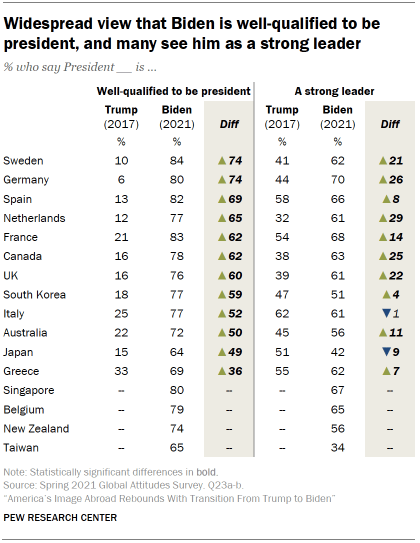
The gap betwixt perceptions of the 2 American presidents is especially broad in Sweden and Germany. Only x% of Swedes thought Trump was well-qualified to be president during his beginning year in role. In the current survey, 84% meet Biden as qualified, a 74 percentage point difference. Among Germans, 6% thought Trump was well-qualified, compared with eight-in-ten who say the same of Biden this year.
A difference of roughly 50 points or more on this question appears in near every state where data is available for both leaders.
Biden and Trump are viewed the most similarly when it comes to perceptions of them equally stiff leaders. In 2017, relatively large shares saw Trump as a strong leader, even in countries where few had confidence in him to do the correct thing in world diplomacy. In countries where data is available for both leaders, more than people tend to encounter Biden as a strong leader, only in several countries, the departure is insufficiently small-scale.
Very few people beyond the publics surveyed think Biden could be described as unsafe (median of xiv%) or arrogant (median of thirteen%). This is a hit departure from how Trump was viewed early in his presidency.
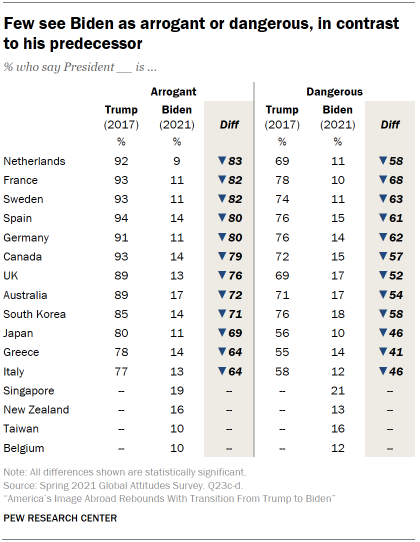
For example, there is an 83-signal divergence in kingdom of the netherlands betwixt those who viewed Trump as arrogant (92%) and those who currently say the aforementioned nigh Biden (9%). Differences of roughly fourscore points or more on this question can also be seen in France, Sweden, Kingdom of spain, Deutschland and Canada.
Similarly, majorities in each country saw Trump as dangerous in 2017, while no more than 21% concord this view of Biden, resulting in differences of roughly xl points or more in countries where data is available for both leaders.
Biden'due south foreign policy agenda broadly popular across avant-garde economies
The Biden administration's foreign policies included on the survey enjoy widespread popularity. Of the four policies tested, the United States' reentry into the Globe Wellness Organisation (WHO) garners the most blessing, with a median of 89% proverb they support the move. Support for this policy is about prevalent in Europe, where shares ranging from 86% to 94% approve of the U.S. returning to the organization. The move is also broadly popular in Canada and the Asia-Pacific.
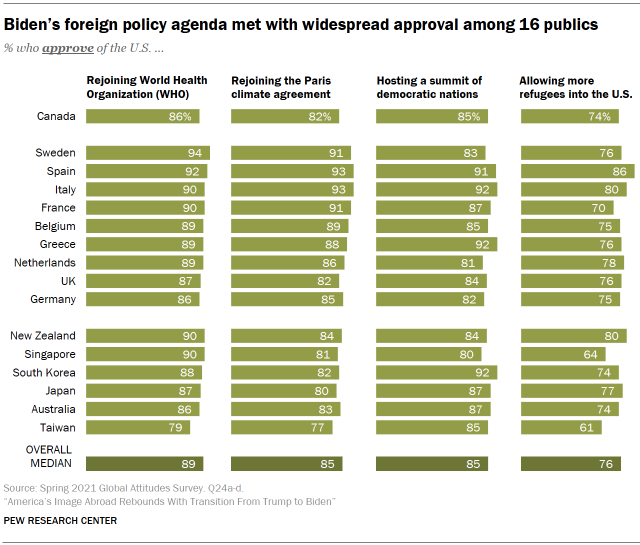
Biden'south determination to recommit to the Paris climate agreement is as well very well received. A median of 85% approve of the U.S. rejoining the accord. Beyond Europe, virtually nine-in-ten or more than across six countries polled favor the movement, with respondents in kingdom of the netherlands, Germany and the Great britain following closely behind. Shares of roughly eight-in-x or greater are also supportive in Canada and the Asia-Pacific region.
Rejoining the accord represents a reversal from onetime President Trump'south decision to withdraw the U.S. from the agreement, a motion that was met with widespread disapproval when Pew Research Center asked near information technology in 2017.
In all countries the Eye surveyed both this twelvemonth and iv years ago, Biden's approach is considerably more pop than Trump's. For instance, in Spain, but 8% approved of Trump withdrawing support for international climate agreements in 2017, while 93% approve of the U.Due south. rejoining the Paris agreement this year, an 85 percentage point difference. In every land, rejoining the agreement is met with approval from shares at least 4 times as large as the shares who supported leaving it.
In addition to Biden's reversal of Trump-era withdrawals from international organizations and pacts, his plans for the U.S. to host a summit of autonomous nations earns widespread blessing. Across the 16 publics polled, a median of 85% limited back up for the convening, and in each, eight-in-ten or more say they favor the programme.
Attitudes toward this policy among several publics are divided past views of American republic. Among nigh publics surveyed, those who call up the U.Southward. is a good example of democracy for other countries to follow back up the summit more than than those who call up the U.S. has never been a practiced instance. For instance, in Sweden, 91% of those who retrieve the U.S. is currently setting a adept example of democratic values approve of the U.South. convening leaders from other democracies, compared with 71% of those who doubt the U.Southward. has e'er set a good example of democracy, a 20-point difference.
Those who view the U.S. as a reliable partner are more than likely to approve of the U.South. hosting a summit of democratic nations in 13 of the publics surveyed. For case, in Germany, 89% of those who retrieve the U.South. is a reliable partner approve of this policy, whereas merely 68% of those who view the U.Southward. every bit unreliable agree, a 21-bespeak difference.
Approving of Biden's plan to increase the number of refugees immune into the U.Southward. is too widespread. A median of about three-quarters support the change, and nowhere do fewer than half dozen-in-ten hold with the decision. This comes every bit Biden reversed his initial goal to raise the refugee cap in the U.S. from the levels set up past the Trump administration, but and so walked back the reversal amidst criticism.
Source: https://www.pewresearch.org/global/2021/06/10/americas-image-abroad-rebounds-with-transition-from-trump-to-biden/
0 Response to "How Can Other Countires Ever Begin to Trust the United States Foreign Policy Again"
Post a Comment